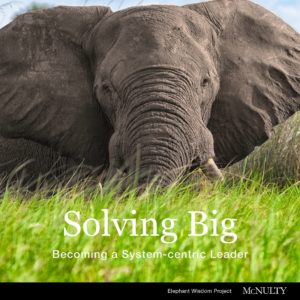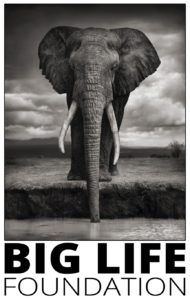“Nature’s great masterpiece, an elephant; the only harmless great thing.”
~ John Donne
COVID-19 UPDATE: Many reports suggest that the current coronavirus outbreak originated in a “wet market” in Wuhan, China where wildlife is sold. The puts the wildlife trade at the root of this pandemic. It is more imperative than ever to eliminate the trade in wild animals and to reimagine a more respectful relationship with the wild world.
The hypothesis of The Elephant Wisdom Project is simple: Unless we have a world where elephants thrive, we will not long have one where humans thrive. That’s why I am working to raise $100,000 for elephant conservation. All net proceeds of my efforts will go to the Big Life Foundation.
A portion of all of my speaking will go to support this initiative. All net proceeds of selected published work and speaking about the system-centric leadership will also be contributed. See the bottom of this page for full details.
Our planet is a rich, interdependent web of life. It is a complex adaptive system as yet fully beyond our capacity to  fully comprehend. It faces critical threats from climate change and human development. We have created a society that over-promotes consumption and underestimates the costs of waste. We routinely privatize profits while shifting costs to the public. Both distort individual behavior and market functions. We see persistent poverty and public health issues as well as species decline that some are calling the “sixth great extinction.” The natural and man-made components of the larger system are in a dysfunctional negative feedback loop. That’s may seem to be a cynical and pessimistic assessment of our current state. I am optimistic, however, that we will rise to the challenge.
fully comprehend. It faces critical threats from climate change and human development. We have created a society that over-promotes consumption and underestimates the costs of waste. We routinely privatize profits while shifting costs to the public. Both distort individual behavior and market functions. We see persistent poverty and public health issues as well as species decline that some are calling the “sixth great extinction.” The natural and man-made components of the larger system are in a dysfunctional negative feedback loop. That’s may seem to be a cynical and pessimistic assessment of our current state. I am optimistic, however, that we will rise to the challenge.
What is required is deep humility and a willingness to tap into the wisdom of humans and our animal companions to craft a more sustainable future. Our own self-interest will be best met by committing ourselves to serving the larger system. This is a job for leaders who are willing to embrace complexity and think differently both about our challenges and potential solutions.
Why elephants? I could have chosen lions, rhinos, wolves, sea otters, dolphins, red knots, or any of a thousand other species under threat. I

Solving Big is the first of four e-essays on systems-centric leadership
have a particular affection for elephants, gentle (most of the time) giants with highly developed family structures and social relationships. The status of African elephants is increasingly precarious. They could be extinct in the wild in my lifetime. I cannot think of a more compelling reason to act.
I have seen elephants only once in the a natural habitat and it was a transformational experience. I have unashamedly chosen a “charismatic mega-fauna” with many fans because the rest is a bit complicated. The goal of this project goes far beyond elephants.
Looking at what works for elephants can promote fresh thinking for what works for humans and other species. I believe that the only approach that will work for elephants and humans is one that incorporates animal conservation, habitat preservation, sustainable economic development, and educational attainment. This is a systems problem which requires systems thinking—specifically, a systems-based approach to leadership. That’s the essence and purpose of The Elephant Wisdom Project.
Through promoting such an approach with writing and speaking on systems-centric leadership, my initial goal is to  raise $100,000 for holistic approaches to elephant conservation. I have selected Big Life Foundation, a registered 501(c)(3) nonprofit organization, as the recipient because of their track record, innovative programs, and commitment to engage all stakeholders in their initiatives:
raise $100,000 for holistic approaches to elephant conservation. I have selected Big Life Foundation, a registered 501(c)(3) nonprofit organization, as the recipient because of their track record, innovative programs, and commitment to engage all stakeholders in their initiatives:
Since its inception, Big Life has expanded to employ hundreds of Maasai rangers—with more than 40 permanent outposts and tent-based field units, 13 vehicles, tracker dogs, and aerial surveillance—protecting 2 million acres of wilderness in the Amboseli-Tsavo-Kilimanjaro ecosystem of East Africa.
Big Life was the first organization in East Africa to establish coordinated cross-border anti-poaching operations.
Here’s how you can help:
- Donate $25 or more to any registered 501c3 organization that supports elephant conservation and then send me an email. I’ll send you a copy of the e-book.
- Book a talk. Up to $1,000 of each of my general speaking engagements goes to The Elephant Wisdom Project. Book me to speak on The Elephant Wisdom Project and system-centric leadership and 100% of the net fee will support the work of the Big Life Foundation.
Support to the Elephant Wisdom Project today
I appreciate every bit of support. So will the elephants.
“The question is, are we happy to suppose that our grandchildren may never be able to see an elephant except in a picture book?”

